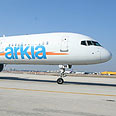
Illustration
Photo: Ilan Levy
On Monday night the Civil Aviation Authority grounded a Russian plane in Israel following a similar move by the authorities at Moscow airport. Two days later, the airlines caught in the fray wondered how the situation had gotten so out of hand.
In Moscow, 260 Arkia passengers were forced to spend the night at the airport after officials there asked to see the crew's visas, though carrying a visa had been rendered unnecessary almost a year ago. The plane was only allowed to take off after Israel grounded a Russian plane in response.
Original Report
Hundreds of passengers spend night at airport after authorities demand unnecessary visas from crew
A senior airline official told Ynet he was not surprised at what had happened. "From time to time the Russian airports create problems for Israeli planes, but this time it crossed the line and the Transportation Ministry was right to take such a rare step," he said.
Another official explained that although Russia and Israel had signed numerous bilateral agreements about the expansion of the flight options between the two countries, many Russian officials were unhappy with the large number of Israeli flights landing throughout the country because it harmed the Russian airlines.
"This is also happening in the Ukraine, and those who suffer are the passengers," the official explained. "The Russian authorities are having a hard time accepting competition and the policy of open skies, and in these agreements they have often tried to expand their own flight rights at the expense of the Israeli airlines. The harsh sanction imposed by Israel proves they only understand force."
Another problem Israeli airline officials face is the matter of obtaining permits for regular flights. In many cases the permits are only granted two or three days before the flights, which created difficulties for the airlines.
In one case, an Israeli plane was forced to return to Russia after takeoff on the false claim that it did not have all the necessary permits. Officials say the tension has worsened since the signing of the visa agreement, which sparked an increase in ticket sales.
"We are familiar with the problem, but we don't know whether it derives from Russian bureaucracy or whether a commercial consideration is behind it," Tourism Ministry official Pini Shani told Ynet.
"This instability is not good for tourism. We want as many Israeli and Russian airlines as possible flying between the countries. Every time there is a new flight agreement or one is expanded there are setbacks, but in the end the Russians always approve the flights at the last minute."
Shani explained that the Russian authorities often ended up hurting their own citizens, since most of the tourists traveling between the countries are Russians vacationing in Israel. He said Tourism Minister Stas Misezhnikov was attempting to quell tensions by making numerous visits to Moscow.















